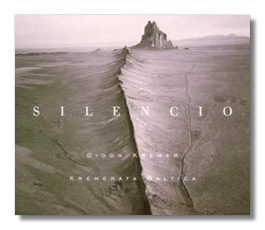
The Internet's Premier Classical Music Source
Related Links
- Latest Reviews
- More Reviews
-
By Composer
-
Collections
DVD & Blu-ray
Books
Concert Reviews
Articles/Interviews
Software
Audio
Search Amazon
Recommended Links
Site News
 CD Review
CD Review
Silencio

- Arvo Pärt:
- Tabula Rasa
- Darf ich…
- Philip Glass: Company
- Vladimir Martynov: "Come In!"
Gidon Kremer, violin
Tatjana Grindenko, violin
Reinut Tepp, prepared piano
Kremerata Baltica/Eri Klas
Nonesuch 79582-2 DDD 68:34
In the booklet to this CD, we find the following words written by composer Arvo Pärt:
"Music must be given the chance to express itself. Words confine music. And then, music makes itself dependent on words. In my view, the very existence of music is jeopardized by today's society's obsession with communication."
I am moved by Pärt's comments and feel the truth in them; we say and write too much and hear too little. Nevertheless, I feel a record company has an obligation to listeners to inform them about what it is that they are listening to, particularly if the music is new or otherwise unfamiliar. The most striking work on this CD is titled "Come In!", and it was written by a composer named Vladimir Martynov. All that Nonesuch tells us is that "Come In!" was written in 1988, and was premièred that year by Grindenko and Kremer in the Grand Hall of the D. Shostakovich Philharmonic Society in Leningrad as part of the 3rd International Contemporary Music Festival. There's also an anecdote by the composer whose message is, in effect, if you want to be admitted into Heaven, you have to knock on its door, which waits inside of you waiting to be found. Need more be said? Perhaps not, but I am nevertheless curious about this voice, which if not new, is at least new to me. "Come In!" reminds me greatly of Valentin Silvestrov's Symphony #5; both are almost unnervingly beautiful and transcendental. It is in six rather uncontrasted movements and is nearly 30 minutes in length. The music floats in an ether inspired by equal parts of slow movements from Beethoven's string quartets, Schubert, Bruckner, and Mahler, with a little extra "sweetener" added. From time to time, the unending song, gently driven on by two solo violins, is punctuated by the even rapping of a woodblock and the pretty chiming of a celesta. To quote from another musical work, Martynov must be knock knock knockin' on Heaven's door.
The other first recording on this disc is Pärt's Darf ich… (May I…) This is a brief work for solo violin, bell, and strings, and a relatively new one; Pärt wrote it in 1995 and revised it in 1999. Barely four minutes long, it is quiet and as humble as music can be… an offering to a God who empties our ears to make our souls that much easier to fill.
Glass's Company was written for string quartet (and recorded for Nonesuch by the Kronos Quartet); here it is played by string orchestra. The arrangement softens its lines, an effect intensified by the romantic and intense playing of the Kremerata Baltica. It adds needed contrast to this CD.
Tabula Rasa came to the public's attention about two decades ago when it was recorded for ECM by Kremer and Grindenko, the same musicians who have recorded it again here. Why record it again? The new version is slower and a little more precise; it seems to have been recorded in a less resonant environment (the Historical Museum in Tallinn) than ECM's, which was a live recording. There's no compelling reason to prefer one recording to the other; both are great.
The Kremerata Baltica is made up of young musicians from the three Baltic states. Kremer founded it in 1996, and already it has recorded an eclectic assortment of music, from Piazzolla to Vivaldi. The present CD is the second in a 6-disc contract with Nonesuch. It will be interesting to see where they go from here. In the meantime, we can enjoy more than an hour of Silencio, a CD whose "high concept" is spared from pretentiousness by the excellence of both the music and the performances.
Copyright © 2001, Raymond Tuttle




















